How Travel Chatbots are Helping City Tourism
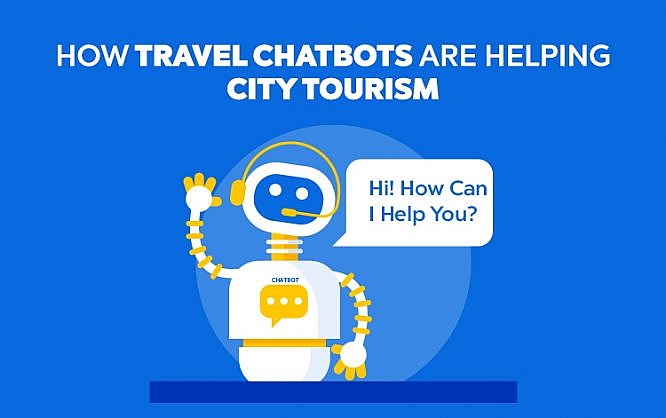
Worldwide tourism has immense potential for growth, and this sector has evolved drastically in the last few decades. Now travel, and tourism is becoming one of the mainstays of the world economy.
According to The United Nations World Tourism Organization report, International tourist arrivals worldwide have grown from 25 million in 1950 to 1.4 billion tourists per year, to present times. Similarly, international tourism revenues worldwide have grown from 2 billion US dollars in 1950 to 1.3 trillion in 2017. This sector contributes 10.4% to the world’s GDP and generates 319 million jobs in 2018 globally.”
Technological advancements, like big data, artificial intelligence, and machine learning, are offering great opportunities for the travel and tourism industry to grow and sustain. The new age travellers' planning begins with googling and ends with online agencies. Technology is transforming the traveller experience. For example, What does perfect travel consist of? Before enjoying a sunset on the beach, you need to spend time finding budget-friendly accommodation, book a flight ticket, and spend at least a couple of hours to check-in. That's how this was going before chatbots were formally introduced in the travel industry. Now, with the help of a chatbot and your smartphone, you can instantly book and pay for hotels, flights, and even do hassle-free check-in in the hotel too.
What is Chatbot?

A chatbot is a computer software interface that conducts human-like communication with the website visitor. It communicates via text or voice-based commands. Chatbots are enabled with Artificial Intelligence and Machine Learning and use Natural Language Processing(NLP) to process user queries. This tool instantly answers your questions anytime and anywhere. It scans your keywords search and responds with pre-set answers available in the database. Chatbots make the customer experience more responsive, accurate, and intelligent.
Facts About Chatbot
- The first chatbot, ELIZA, was created by Joseph Weizenbaum in 1966.
- According to a survey, US is home to the most significant portion of the world’s chatbot users (36%), followed by India (11%). Germany comes in the third place (4%)
- Experts predict 90% of customer interaction will be automated by 2022.
- Companies will save 2.5 billion customer service hours using chatbots by the end of 2023.
How does chatbot benefit the travel industry?
Chatbots software provides unbeaten experience to businesses and their customers. Nowadays most people are eternally dependent on the internet to plan their trip. That's the reason chatbot has a significant influence on the travel industry. This software answers your frequently asked questions without human interaction and saves money as well as time. In this way, Chatbot can manage multiple customers concurrently and even handle your complex issues and give a proper solution to what you are seeking. It has aligned the process to improve traveller experience and hospitality business to decrease customer churn, boost sales and revenues.
The chatbot market is growing swiftly. We already have millions of chatbots activated in different industries, which is why investing in chatbots could give you a decisive edge over the competition.
1) Reduce Operational Cost and Workload
Chatbots are an extremely cost-effective solution. Artificial intelligence-enabled bots assist travel agencies in solving routine customer queries. This means businesses no longer depend on third party customer care centers. Additionally, new travel startups can directly shift to chatbots instead of developing a mobile app to save resources. The technology and algorithm used behind the development are sophisticated enough to create a complex solution with ease. Chatbot has the potential to reduce both the workload on your employees, and customer support costs up to 30%. According to the reports, The average cost of building a chatbot from scratch is around $10,000 — $15,000.
2) Save Time and Efforts
Chatbot can handle multiple customer queries and save productive time. This will enable management to engage their workforce in other complex managerial activities. For instance, If your bot is intelligent enough to handle frequently asked customer queries, then it will reduce pressure on the many airline employees; from ground staff to cabin crew. Also, it will save customers’ time that is spent reaching out to service representatives and listening to that annoying 30 min long solo music on the helpline!
3) Enhance personalization and Customer Engagement
Travel chatbots work tirelessly to serve customers 24×7, 365 days a year. This continuous accessibility enhances customer engagement in the travel sector. Where customers seek their problems to be resolved immediately, even as they travel across time-zones.
Chatbot can serve as a local tour guide as they can tell you about nearby hotels, restaurants, and other attractions. For example, Foursquare’s chatbot, Marsbot, allows travelers to find restaurants, cafes, and bars wherever they go, based on their preferences and their location. If you are with a group, you can use it to find activities that are perfect for team travel.
Of course, travel chatbots can ensure maximum customer personalization too.
4) Give More Revenue Opportunity
Travel agencies can use chatbot as a lead capturing tool. This tool can take the customer from awareness stage to conversion stage within minutes. Research shows that 65% of the holiday tourists and 69% of business travelers find online booking more convenient, and 92% of millennials find live chat engaging. In this way, you can add offers, coupons, and even a payment gateway in your chatbots to grab more customers online and make them lifelong subscribers of the platform. All these things bring the possibilities of increasing revenue growth through chatbots.
Popular Travel Chatbot Examples
1) Ana: Copa Airlines’ virtual Assistant
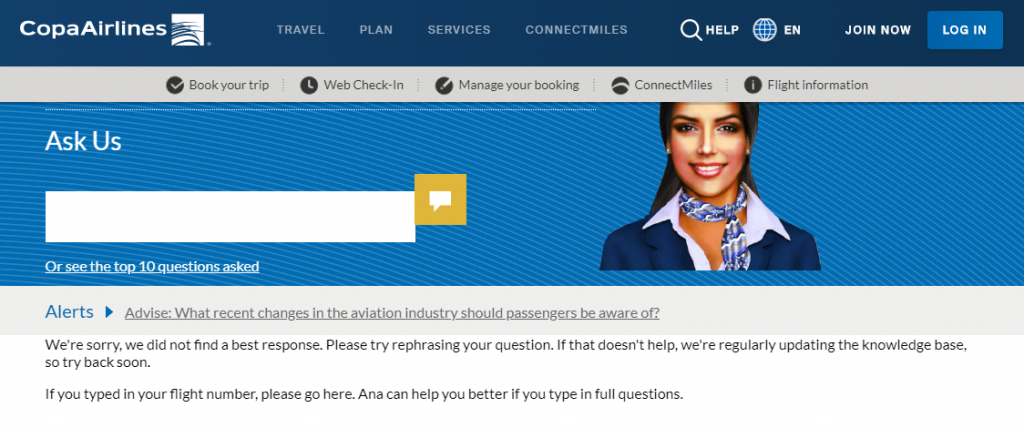
Copa Airlines comes with Ana- web-based chatbot. It uses natural language processing to answer simple FAQs, such as what destinations Copa Airlines flies to or How many bags can one bring with them? And she will respond instantly within your browser. Most of the answers she offers are available elsewhere on the website.
2) Goibibo’s chatbot Gia
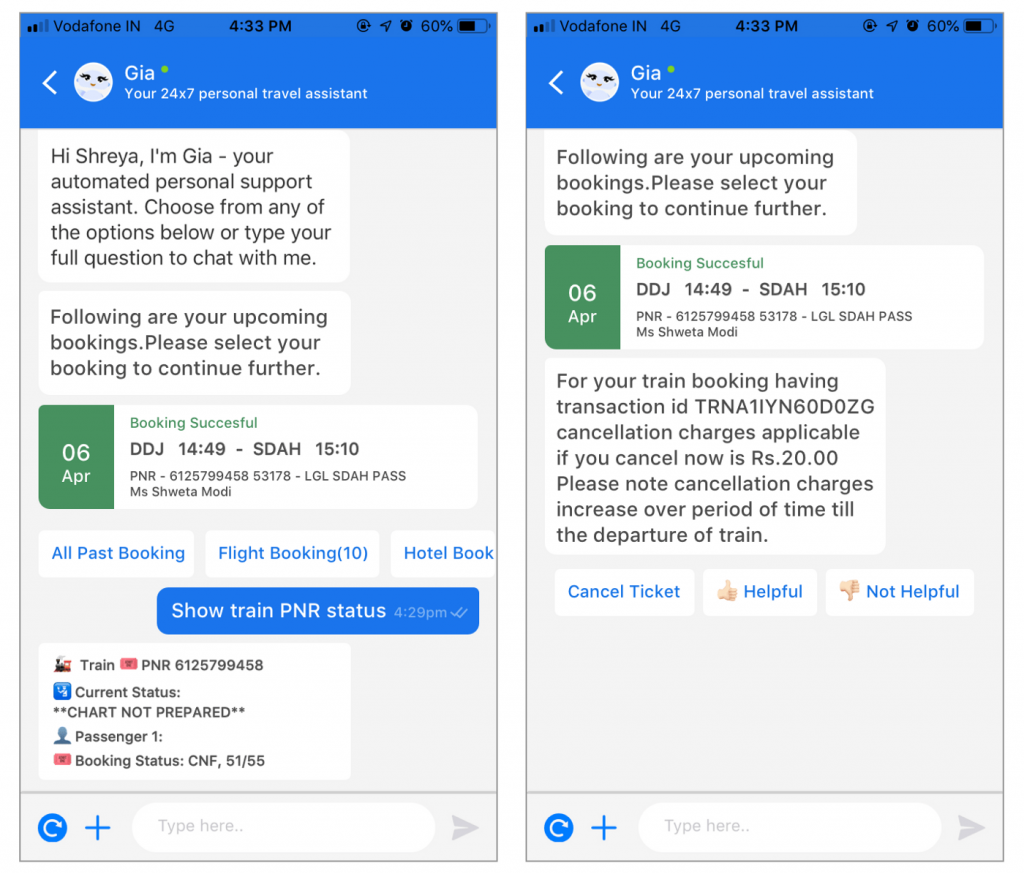
Goibibo’s chatbot reduces human intervention in the ticket-booking and seat-selection process, as well as post-booking inquiries, by 25%. Gia chatbot seamlessly delivers hotel vouchers on the customer’s choice messaging app. Goibibo coined the term ‘Human Interactions Saved’ to measure Gia’s efficiency. Currently, Gia solves 60% of all customer queries.
3) Expedia Facebook Messenger Bot
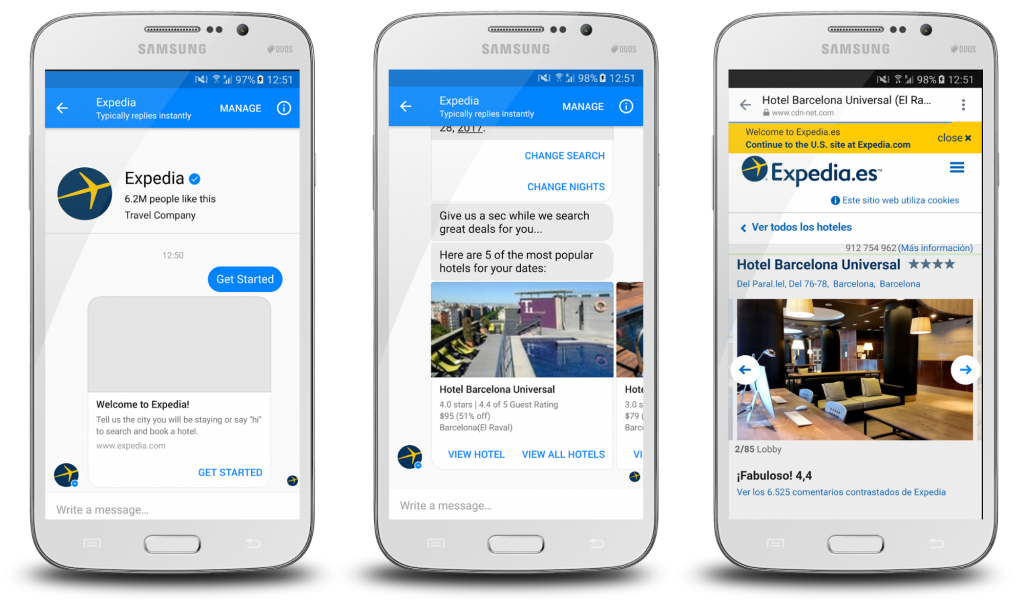
Expedia unveiled its Facebook chatbot on June 8, 2016. it allows users to search and book a hotel through chatbot. Users simply need to open Facebook Messenger and type in Expedia, and then you come across with their chatbot, which asks you a bit about your travel plans, and some related questions. Once the bot has enough information to process, it will show you the most popular hotel options for your location.
4) Julie: Virtual assistant for Amtrak
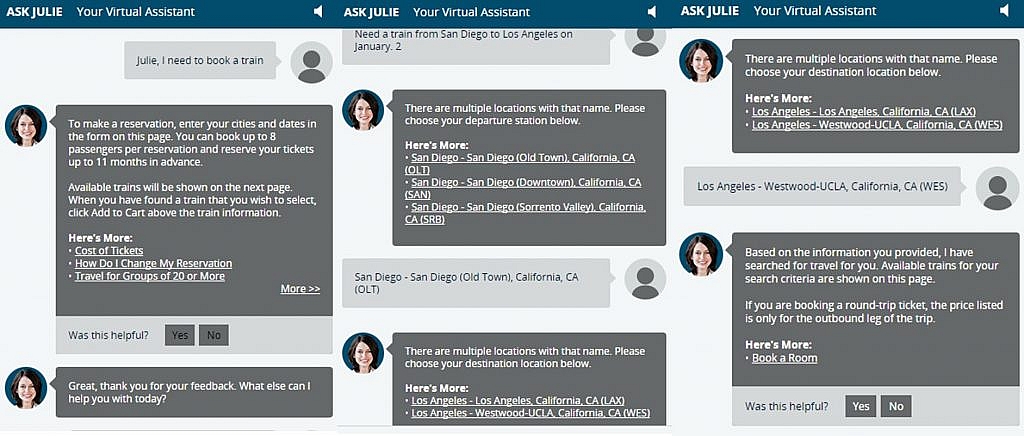
Amtrak integrates virtual assistant Julie on their site. This chatbot works on NLP protocols to process the question asked by the customer. Julie redirects you to the most relevant webpage on-site and gives you a specific answer to your question or keyword inquiry. It operates in a separate pop-up box so that you can easily navigate the Amtrak site. Julie can help you with booking reservations, learning about the train stations. While she doesn’t fill out travel information for you, she can vocalize and advise her answers, so that you can do it correctly.
5) Hello Hipmunk

Hipmunk is an online platform founded in 2010. It offers a variety of services that help users to plan a trip and book reservations. It also can classify through booking emails and calendar items to build personalized itineraries.
Hipmunk’s chatbot Software, Hello Hipmunk, is a chatting interface that allows a user to send their questions or comments like, “Can you find me a hotel for June?” or “Send me flights to Boston for this weekend.” The Hello Hipmunk then processes these queries and will respond with recommendations that it has pulled from the various airline, hotel, or other travel sites.
Final Verdict
Sustainability is the biggest issue, and staying ahead of the competition is the biggest challenge in the travel and tourism industry. If you want to provide high-quality customer experience and keep them engaged with your platform, your business needs a travel chatbot.
With many successful use cases, you can develop a chatbot to meet the needs of a travel business of any size.
Featured Image by Freepik

very nice blog. Thanks for sharing